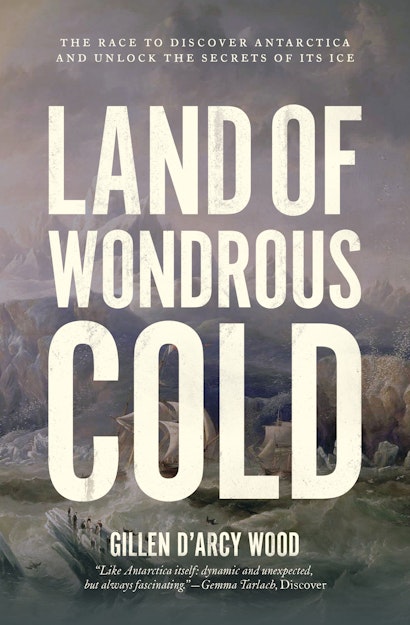Antarctica, the ice kingdom hosting the South Pole, looms large in the human imagination. The secrets of this vast frozen desert have long tempted explorers, but its brutal climate and glacial shores notoriously resist human intrusion. Land of Wondrous Cold tells a gripping story of the pioneering nineteenth-century voyages, when British, French, and American commanders raced to penetrate Antarctica’s glacial rim for unknown lands beyond. These intrepid Victorian explorers—James Ross, Dumont D’Urville, and Charles Wilkes—laid the foundation for our current understanding of Terra Australis Incognita.
Today, the white continent poses new challenges, as scientists race to uncover Earth’s climate history, which is recorded in the south polar ice and ocean floor, and to monitor the increasing instability of the Antarctic ice cap, which threatens to inundate coastal cities worldwide. Interweaving the breakthrough research of the modern Ocean Drilling Program with the dramatic discovery tales of its Victorian forerunners, Gillen D’Arcy Wood describes Antarctica’s role in a planetary drama of plate tectonics, climate change, and species evolution stretching back more than thirty million years. An original, multifaceted portrait of the polar continent emerges, illuminating our profound connection to Antarctica in its past, present, and future incarnations.
Discussion Questions
- Which of the three Antarctic expedition leaders—the reluctant journeyman Dumont D’Urville, the lovesick marine biologist James Ross, or the ill-fated novice explorer Charles Wilkes—do you most identify with? Whose voyage would you most want to join?
- In the interlude between chapters 1 and 2, Wood introduces the Hollow Earth theory which was wildly popular in Victorian England, including among literary luminaries like Lewis Carroll and Edgar Allen Poe. If you were alive in the 1830s, do you think you would have been a Hollow Earther? What are some examples of scientific mysteries today that you think could potentially end up debunked as straightforwardly as the Hollow Earth theory was?
- How were Joseph Hooker’s theories about Antarctic land formation, thoroughly dismissed at the time by his peers including Charles Darwin, later proven to be true by scientists working on the Ocean Drilling Project (ODP) in 1988 and 1998?
- How is modern meteorology indebted to the US Exploring Expedition? Do you think that the harrowing experiences with Polar storms and the subsequent contribution that recounting those experiences made to science excuse Lieutenant William Hudson’s failure to log the Peacock‘s sighting of the Antarctic shore hours before Dumont D’Urville and his French crew?
- The kelp highway, uncovered in no small part thanks to the seaweed obsessions of Dumont D’Urville and Joseph Hooker, has been shown to be the primary route by which prehistoric Americans journeyed South to the polar edges of Patagonia and the Tierra del Fuego. Like these early humans, if given the opportunity, would you eat Durvillaea antarctica?
- How did the discoveries that Jim Kennett and his team made on Leg 29 lead to a revolution in twenty-first century Earth system science that forever linked the study of land, oceans, atmosphere, and biota in an interconnected whole?
- The Adélie penguin is Antarctica’s most iconic resident. What have scientists discovered about the geologic history of Antarctica by studying these penguins and their paleolithic forbears? These penguins were also the first harbingers for Dumont D’Urville and his crew of the fabled Terra Australis Incognita. After following the diving penguins and sighting land that fateful January morning, D’Urville broke with tradition announcing that the new continent would be called “Terre Adélie” and its citizen multitude, Adélie penguins. What did you make of this decision? What do you think was D’Urville’s motivation for naming the new land after his distant wife?
- William Whewell called the magnetic crusade “by far the greatest scientific undertaking the world has ever seen.” What was the magnetic crusade and how was it ultimately even more scientifically significant than its original proponents, Alexander von Humboldt, Edward Sabine and James Ross, could have ever imagined?
- Who do you think “won” this race of scientific discovery? Was it Dumont D’Urville who was the first to spot (or at least log his spotting of) Antarctic ice? Or was it Charles Wilkes whose crew charted the greatest stretch of coast and established its continental dimensions? Or was it James Ross who, while being the last on the scene, traveled the farthest, saw the most, and laid the strongest foundation for the polar explorers of the later Heroic Age?
- In the brave new world of “marine ice sheet instability,” what can we learn from the mixed feelings of wonder and terror recounted in the stories of these brave Victorian scientist-explorers? What risks do you think we and the generations of human yet to come will have to take to stave off the uncertainty brought on by our changing climate?
av������ the Author
Gillen D’Arcy Wood is professor of environmental humanities at the University of Illinois, Urbana-Champaign, where he serves as associate director of the Institute for Sustainability, Energy, and the Environment. He is the author of Tambora: The Eruption That Changed the World (Princeton). Originally from Australia, he lives in Urbana, Illinois, with his wife and two children.

